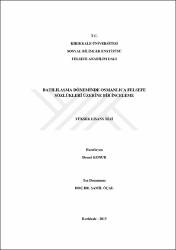| dc.contributor.advisor | Öçal, Şamil | |
| dc.contributor.author | Konur, Demet | |
| dc.date.accessioned | 2021-01-16T19:01:22Z | |
| dc.date.available | 2021-01-16T19:01:22Z | |
| dc.date.issued | 2015 | |
| dc.identifier.uri | | |
| dc.identifier.uri | https://hdl.handle.net/20.500.12587/15481 | |
| dc.description | YÖK Tez ID: 440093 | en_US |
| dc.description.abstract | Batılılaşma döneminde yazılan Osmanlıca felsefe sözlüklerinin incelendiği bu çalışmada birinci bölüm geniş anlamda dil felsefesine ayrılmıştır. Öncelikle "dil" den ne anlaşılması gerektiğine ve bu anlamdaki dilin felsefe bağlamında yer aldığı önemli akımlara, düşünürlere yer verilmiştir. Bu görüşle devam eden çalışmanın ikinci bölümü felsefe sözlüklerinin hazırlanış, gelişim ve çeşitliliklerine ayrılmıştır. Felsefenin bel kemiği sayılan kavramların düşünce- dil- varlık- yazı bağlamında ne denli önemli olduğunu açıklamak için bu zamana kadar gelen önemli felsefe sözlüklerine ve sözlükçülerine yer verilmiştir. Bu amaçla ilerleyen çalışmanın temel kaynağını oluşturan Batılılaşma döneminde yazılan Osmanlıca felsefe sözlüklerinin geniş kapsamlı tanıtımı yapılmış ve farklı felsefe dallarından seçilen kavramların sözlükler çerçevesinde ve terminolojik olarak karşılaştırmalı açıklamalarına ise üçüncü bölümümüzde yer verilmiştir. Çalışmamızın son bölümü olan bu bölümde seçilen kavramların günümüzde hangi anlamlarda kullanıldığı ve sözlükler arası farklılıklar açıklanmaya çalışılmıştır. | en_US |
| dc.description.abstract | In this work, which studies Ottoman Turkish philosophy dictionaries written during the Westernization era, mostly philosophy of language was analysed in the first chapter. It included what primarily needs to be understood from "language", important movements and philosophers within the context of the philosophy of language. With this perspective in the second chapter, preparation, development and varieties of the philosophy dictionaries were mentioned. It included important extant philosophy dictionaries and lexicographers to explain the importance of the concepts which are considered as the backbone of philosophy within the context of idea-language- being- writing. The third chapter included a comprehensive introduction of Ottoman Turkish philosophy dictionaries written during the Westernization era which constitutes the primary resources of this study and also included comparative explanation of the concepts chosen from different philosophy branches on the basis of lexis and terminologically. In this chapter, which is the last chapter of my study, it was tried to explain the current meanings of these chosen concepts and the differences between the dictionaries. | en_US |
| dc.language.iso | tur | en_US |
| dc.publisher | Kırıkkale Üniversitesi | en_US |
| dc.rights | info:eu-repo/semantics/openAccess | en_US |
| dc.subject | Dilbilim | en_US |
| dc.subject | Linguistics ; Felsefe | en_US |
| dc.subject | | en_US |
| dc.subject | | en_US |
| dc.subject | | en_US |
| dc.subject | | en_US |
| dc.subject | | en_US |
| dc.subject | | en_US |
| dc.subject | | en_US |
| dc.subject | | en_US |
| dc.subject | | en_US |
| dc.subject | | en_US |
| dc.subject | | en_US |
| dc.subject | | en_US |
| dc.title | Batılılaşma döneminde Osmanlıca felsefe sözlükleri üzerine bir inceleme' | en_US |
| dc.title.alternative | The examination of philosophcical dictiniories pressed during the westernization era | en_US |
| dc.type | masterThesis | en_US |
| dc.contributor.department | KKÜ, Sosyal Bilimler Enstitüsü, Felsefe Anabilim Dalı | en_US |
| dc.identifier.startpage | 1 | en_US |
| dc.identifier.endpage | 174 | en_US |
| dc.relation.publicationcategory | Tez | en_US |
















